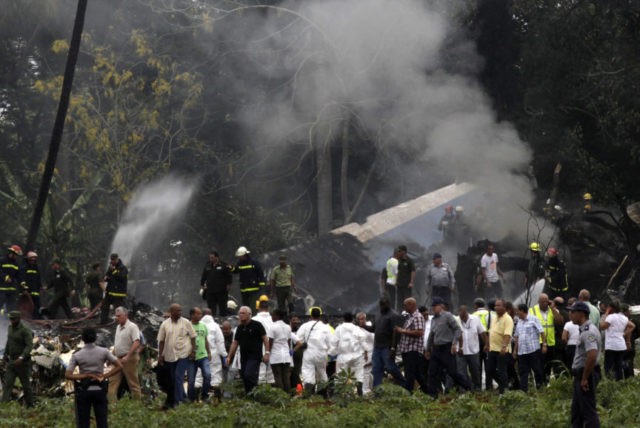A pilot who claims to have flown the doomed Boeing 737-200 that crashed in Havana, Cuba, Friday, gave the Mexican newspaper Milenio copies of documents detailing the egregious safety violations he regularly alerted his superiors to while working for the company.
Marco Aurelio Hernández told Milenio in an exclusive interview Saturday that he few three Boeing 737s that belonged to Damojh Airlines – now known as Global Air – while he worked as a pilot for the company between 2005 and 2013.
One of the planes was the one flying Cubana Flight DMJ 0972 on Friday, which crashed shortly after takeoff, killing at least 110 people. Three survivors, all women, remain in critical condition, and doctors in Havana say their survival is far from guaranteed given the extensive and “complex” damage their bodies sustained in the crash.
Milenio insists it has copies of his complaints to superiors and proof that Hernández’s story is true.
Hernández lists among the complaints he had of the state of the planes he flew flat tires, electrical failures, unusable radar systems, and motor failure.
His latest complaint occurred in October 2013; Milenio reproduces a copy of it on their site.
“I have here in my hands, from October 2013, a complaint for lack of maintenance of the planes,” he told the outlet. “There are very capable mechanics [at the airline], but they need care, they need parts that are necessary to make the planes, if not 100 percent [safe], at least 80 or 90 percent.”
“I had several instances with this company like engine failures, like one time we lost the electrical system during takeoff in Mexico and another time, I was on board a Mexico-Cuba flight and … we had to return and repair the electrical grid,” he noted.
Hernández says he flew many flights during a two-month period with Captain Jorge Luis Núñez, the pilot who died in Friday’s flight, most in Chile. The Boeing 737 under their charge in Chile was eventually grounded, he told the Mexican newspaper.
“The anomalies that the planes in Santiago de Chile led the inspectors to tell us: ‘that plane is a tin pot, return home because that trash isn’t flying in Chile,'” Hernández said. This defect is what the pilot documents in the 2013 complaint.
Hernández described Nuñez as a “very capable, very prepared, very serious” pilot, suggesting human failure was unlikely in the case of this flight. Cuban authorities have recovered the plane’s black box but not indicated that they have any evidence leading to a conclusion on what caused the fatal crash.
Hernández is far from the only witness coming forward to condemn Damojh.
Capital Ovidio Martínez López, who also claimed to have experience with the airline, claimed in a post on Facebook that the Cuban government had warned Cubana, the national airline, to stop renting aircraft from Damojh following the alleged disappearance of a plane flying over Santa Clara, central Cuba, in 2011. Martí Noticias, which published the contents of the post, did not independently corroborate the claim. The Associated Press also relayed the Facebook post, also without independent corroboration.
The AP published a litany of complaints against Damojh on Sunday, citing Guyanese officials. Guyana – one of the few places Cubans can travel to without a visa – had banned the Boeing 737 that crashed on Friday from its airspace because the airline was allowing passengers to bring too much luggage onto the plane. The AP notes that, because travel to Guyana is easy, many Cubans fly there and buy goods that are not easily accessible in Cuba due to the failure of that country’s communist system.
“After Easy Sky canceled a series of flights in spring 2017, leaving hundreds of Cubans stranded at Guyana’s main airport, authorities began inspecting the plane and discovered that crews were loading excessive amounts of baggage, leading to concerns the aircraft could be dangerously overburdened and unbalanced,” AP reports. “In one instance, Guyanese authorities discovered suitcases stored in the plane’s toilet.”
Granma, the official newspaper of the Cuban Communist Party, has not reported the various complaints surfacing against Damojh from former pilots and foreign governments at press time. Most of its coverage of the plane crash has celebrated the efficiency of the Communist Party, announcing that the investigation into the incident is “advancing” without detail. The reports do note that the United States has authorized Boeing to work with the Cuban government on investigating the incident, independent of embargo restraints.
Granma did publish remarks by a Cuban aviation official defending the use of rental planes from dubious companies by attacking the United States.
“It’s normal for us to rent planes,” Yzquierdo said, in an AP translation. “Why? Because it’s convenient and because of the problem of the blockade that we have. Sometimes we can’t buy the planes that we need, and we need to rent them.”
According to AP, Mexican government officials have stated the plane in question was legally cleared to fly as of November 2017.
The final count the Cuban government released of individuals on the plane is 113 people – 107 passengers and 6 staff. The staffers were Mexican; 102 passengers were Cuban; 3 foreign tourists have been identified, and two individuals from Western Sahara, likely students.
Most of the Cuban passengers were natives of eastern Holguín, the flight’s destination.
Follow Frances Martel on Facebook and Twitter.

COMMENTS
Please let us know if you're having issues with commenting.